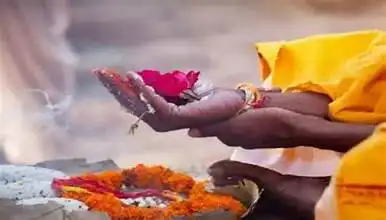Sarva Pitru Amavasya, also known as Mahalaya Amavasya, is an important Hindu observance and ritual that is dedicated to paying homage to one’s ancestors or pitrus. It falls on the new moon day (amavasya) in the lunar month of Bhadrapada, which typically corresponds to September or October in the Gregorian calendar. Sarva Pitru Amavasya holds great significance in Hindu culture, particularly in honoring and remembering deceased ancestors.

Key aspects and customs associated with Sarva Pitru Amavasya include:
Pitru Tarpana:
On this day, Hindu families perform a special ritual known as “Pitru Tarpana” or “Tarpan,” where they offer prayers, water, sesame seeds, and food to their ancestors. This is done near rivers, holy bodies of water, or at temples. The act of offering is believed to help the souls of the departed ancestors attain peace and salvation.
Mahalaya:

In the days leading up to Sarva Pitru Amavasya, there is a period known as “Mahalaya.” It typically lasts for 15 days and involves daily recitations of prayers, hymns, and mantras dedicated to the pitrus. People also visit holy places, such as Gaya in Bihar, which is considered highly auspicious for performing ancestral rituals.
Charity:
It is common for people to engage in acts of charity and donate to the less fortunate during this time, as it is believed to bring blessings and merit to both the living and the deceased.
Offerings:

Along with water, sesame seeds, and food, some offerings may include rice, black sesame seeds, barley, and milk. These offerings symbolize the sustenance of the ancestors’ souls.
Fasting:
Some individuals observe a partial or complete fast on Sarva Pitru Amavasya as a mark of respect for their ancestors. The fast is usually broken after performing the Tarpana ritual.
Prayers and Mantras:
Special prayers, hymns, and mantras are recited during the Tarpana ritual, seeking blessings for the departed souls and expressing gratitude for their contributions to the family’s lineage.

Note: Sarva Pitru Amavasya is a solemn and heartfelt occasion for many Hindus, as it allows them to connect with their ancestral roots and express reverence for their forefathers. It is believed that by performing these rituals, the souls of the departed ancestors find peace, and their blessings continue to protect and guide their living descendants.









